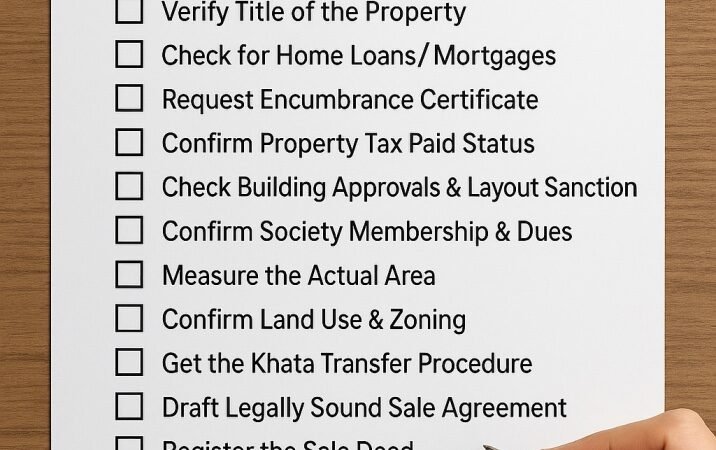Buying a resale property — whether it’s a flat, an independent house, or a villa — can be a smart move.
You avoid construction delays, get what you see, and often find homes in established neighborhoods.
But there’s a catch.
Unlike new launches by reputed developers, resale properties require far more legal due diligence.
You’re not just buying a home — you’re buying its legal and financial history.
So how do you protect yourself?
Here’s a complete legal checklist for buying a resale flat or house in India, based on years of real-world property law practice.
🧾 1. Verify the Title of the Property
This is non-negotiable.
You must confirm that the seller is the legal owner of the property and has the right to sell it.
✅ Ask for:
- Sale deed (registered)
- Khata/Patta/RTC (depending on the state)
- Mutation records
- Latest property tax receipts
- Encumbrance Certificate (EC) for the last 30 years
💡 Hire a property lawyer to conduct a detailed title verification — don’t rely on the seller’s word.
🏦 2. Check for Any Home Loans or Outstanding Mortgages
If the seller has taken a home loan, the property may be mortgaged to the bank.
You need:
- A Loan closure letter
- No Dues Certificate (NDC) from the bank
- Release deed from the Registrar’s office
- Bank NOC (No Objection Certificate)
🛑 Never proceed without checking if the loan has been cleared.
🧾 3. Request the Latest Encumbrance Certificate (EC)
An EC is proof that the property has no legal dues or charges registered against it.
✅ Apply for a 13–30 year EC from the sub-registrar office.
Make sure it includes:
- All past transactions
- Mortgages, if any
- Sale/purchase chain
If there’s any gap in ownership or unexplained transaction, investigate thoroughly.
🏛️ 4. Confirm Property Tax Paid Status
Unpaid taxes are a liability that passes on to the buyer.
✅ Ask for:
- Latest property tax receipts
- Online tax records from BBMP, MCD, GHMC, or local body
If taxes are pending, insist the seller clears them before sale.
🏠 5. Check Building Approvals and Layout Sanction
In case of a flat or apartment:
- Ask for the building plan sanctioned by the local authority
- Make sure the flat is part of an approved layout or apartment complex
- Check for completion certificate (CC) and occupancy certificate (OC)
💡 Buying a resale flat without OC can cause legal problems later — especially for Khata transfer, loans, and resale.
📜 6. Confirm Society Membership and Dues (for Flats)
If you’re buying a flat in a gated society or apartment:
✅ Ask the seller or association for:
- Society NOC
- Share certificate (if it’s a cooperative housing society)
- Dues clearance letter
- Any pending maintenance charges or legal disputes
🛑 You won’t be able to register the property if society objections exist.
🏗️ 7. Measure the Actual Area
You’re buying a specific area — don’t just go by the sale deed.
✅ Get a physical measurement of:
- Carpet area
- Built-up area
- Super built-up area
- Plot dimensions (if independent house or villa)
Use a licensed surveyor or architect to verify the floor plan.
🏛️ 8. Confirm Land Use and Zoning (for Plots/Houses)
For independent houses or plots:
- Check if the land is residential (not commercial/agricultural)
- Get Zoning clearance from the town planning authority
- Make sure there’s no land acquisition notification
This is especially important in peri-urban areas and villages.
📑 9. Get the Khata Transfer Procedure Right
In Karnataka, you must ensure the Khata is transferred to your name after purchase.
Steps:
- Seller should submit Form I & II with sale deed
- Pay Khata transfer fee
- Get Updated Khata Certificate & Extract in your name
💡 Without Khata, you can’t pay taxes, get building permits, or sell later.
👨⚖️ 10. Draft a Legally Sound Sale Agreement
The Agreement to Sell should include:
- Details of buyer/seller
- Sale consideration and payment breakup
- Possession date
- Encumbrance clause
- Seller warranties
- Indemnity for past dues
- Penalty clause for default
🖋️ Have this agreement drafted or vetted by a property lawyer.
🏘️ 11. Register the Sale Deed with the Sub-Registrar
On the final day of transaction:
- Execute the Sale Deed
- Pay stamp duty + registration charges
- Register the deed at the local Sub-Registrar Office
Also collect:
- Registered deed copy
- E-Stamp certificate
- Thumb impressions and photos
💡 Registration is what gives you legal title. A notarized or signed paper is not enough.
📂 12. Post-Sale Formalities Checklist
Once registered, you must:
- Apply for Khata transfer
- Update electricity, water, gas connections
- Inform the housing society
- Get mutation done with the revenue department
- Update property insurance (if applicable)
Don’t skip these — they help secure your title.
⚖️ Legal Tip: Always Hire a Property Lawyer for Verification
A resale flat or house comes with:
- Prior ownership history
- Possibility of pending dues
- Potential illegal alterations
- Risks of fraud or forgery
Hiring a real estate lawyer is not optional — it’s a necessity.
📋 Summary: Resale Property Due Diligence Checklist
Here’s your quick recap:
🔲 Seller’s title documents
🔲 EC (13–30 years)
🔲 Sale deed & Khata/Patta
🔲 Property tax paid proof
🔲 Bank NOC and loan closure
🔲 Society NOC and dues cleared
🔲 Area measurement & plan approval
🔲 OC, CC, Zoning check
🔲 Sale agreement with legal vetting
🔲 Registration of deed
🔲 Post-sale legal formalities
📩 Call to Action
At RJ Property Law, we specialize in:
- ✅ Resale property legal checks
- ✅ Title verification and document scrutiny
- ✅ Drafting legally airtight sale agreements
- ✅ Representation during registration and mutation
Don’t let your dream home turn into a legal headache.
Let us handle your due diligence with precision and care.
📧 Email: ranjinijayaram@rjpropertylaw.com
📞 Phone: +91 80884 17193
🌐 Website: www.rjpropertylaw.com

